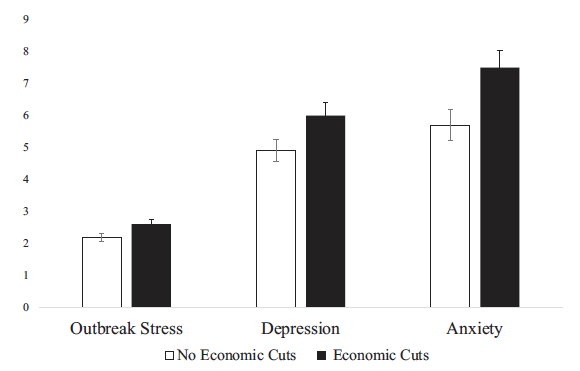Low-Income Latina Mothers Need Protection from Pandemic’s Economic and Psychological Strain
By Leah C. Hibel, Chase J. Boyer, Andrea C. Buhler-Wassmann, and Blake J. Shaw, UC Davis
Systemic oppression makes the Latino community especially vulnerable to the economic, health, and psychological risks of the COVID-19 pandemic. Latina mothers, in particular, must navigate the pandemic from their racialized, gendered, and classed positions while caring for children and families. In a recent study, conducted during California’s initial shelter-in-place mandate (March 20 – June 1, 2020), we surveyed 70 Latina mothers from Sacramento and Yolo Counties. We assessed stress, depressive symptoms, and anxiety symptoms among these women. We also assessed the impact on such symptoms of receiving CARES Act federal stimulus checks. We found that 52.9 percent of mothers were making economic cutbacks, and that such cutbacks were associated with increased depressive and anxiety symptoms. Receiving the stimulus payment did not reduce cutbacks or alleviate symptoms. Our findings suggest that low-income Latina families in the US require greater state and federal protection from the fallout of the current pandemic.
Key Facts
- We assessed stress, depressive symptoms, and anxiety symptoms among 70 Latina mothers in two California counties during the state’s first shelter-in-place mandate.
- 52.9% of mothers were making economic cutbacks, which were associated with increased depressive and anxiety symptoms not alleviated by stimulus payments.
- Low-income Latina families in the US require greater state and federal protection from the fallout of the COVID-19 pandemic.
Systemic institutional discrimination and the exponential increase in internal immigration enforcement have made Latino families in the US more likely to experience poverty and low-wage work.[1,2] The April 2020 jobs report partially highlighted these inequalities, revealing the unemployment rate for Latinos to be 18.9 compared to 14.2 for non-Latino Whites.[3] Further, Latino essential workers earn less per hour than non-Latino Whites essential workers in every sector of essential occupations.[4] These problems are compounded during the economic recession resulting from the pandemic.
Hispanic/Latino workers are also more likely to work in occupations—such as crop production, hospitality, food service, food manufacturing—that preclude the recommended physical distancing to reduce virus transmission. It is unsurprising, then, that Hispanics/Latinos are hospitalized for COVID-19 at a rate four times higher than non-Hispanic Whites.[5] To make matters worse, Latino individuals’ real and perceived increased threat of illness and death for friends, family, and themselves is likely to present downstream consequences for their mental health and well-being.[6]
Such consequences are particularly acute for mothers. “Motherwork,” which includes crucial caregiving, child-focused household labor, and relationship building to sustain family cohesion is largely unpaid, undervalued, and invisible.[7] The pandemic has increased the care burden for mothers, who are experiencing outbreak-related decreases in mental health at higher rates than fathers.[8] The mental health toll might be especially potent for mothers who are simultaneously caring for children and maintaining paid employment.[9] With all this in mind, in our study we examined individual, family, and economic factors associated with greater experiences of stress, depressive symptoms, and anxiety symptoms.[10]
Measuring the Impact of the Pandemic
The 70 Latina mothers we surveyed ranged from 18 to 47 years of age. On average, the child the mother reported on was 3.3 years old. Most mothers (77.1 percent) were married or in a romantic relationship. The modal annual household income was $35,001 to $40,000. Unemployment was high among the families at 27.1 percent. Of the families with at least one employed adult, 91.7 percent contained an essential worker. At the time of the survey, none of the mothers reported that they, their child, or someone who lived with them had or probably had contracted the novel coronavirus.
Mothers responded to our survey by phone between March 20 and June 5, 2020. We asked them to provide basic demographic information about themselves and their children, including that related to health and healthcare access; to indicate the extent to which they had made economic cutbacks in the previous two weeks; to report on their levels of stress and worry; and to respond to questions designed to assess their depressive symptoms. We then analyzed their collective responses using multiple linear regression models.
Cutbacks Were Associated with Increased Stress and Anxiety
We found no association between days the participant had been under the “sheltering in place” order and depressive symptoms. Likewise, worries surrounding self- or child-contraction of the virus were not associated with depressive symptoms or with anxiety symptoms. Despite the majority of these families consisting of at least one employed adult, and the majority of these employed adults working as essential workers, many of these low-income families were forced to reduce their household spending. Specifically, about half (52.9 percent; n = 36) of the mothers reported being forced to engage in at least one economic cutback in response to the pandemic. These mothers reported higher outbreak stress, depressive symptoms, and anxiety symptoms than those who had not cut back on expenses, and the differences were significant (Figure 1). Further, for families with an employed adult (n = 51), fears of contracting the virus at work were significantly associated with contract worry.
Figure 1: Economic Cutbacks in Response to the Pandemic is Associated with Higher Outbreak Stress, Depressive Symptoms, and Anxiety Symptoms (n = 36) Compared to Those Not Making Economic Cutbacks (n = 34)

Stimulus Payments Did Not Reduce Cutbacks or Stress
At the time of their call, 65 percent of the families had received the stimulus payment. Mothers who had received the stimulus payment did not report less outbreak stress, depressive symptoms, or anxiety symptoms. They also did not report less contract worry, nor were they less likely to have engaged in economic cuts.
Though the stimulus may have prevented some families from falling below the poverty line, our analyses suggest that many low-income families still face significant financial hardship. This hardship appears to be placing families on a trajectory toward hunger and eviction. Based on this, we recommend additional monthly stimulus payments to prevent significant economic hardship and its consequences.
Latina Mothers Need Greater Support and Protection
Parents’ psychological distress often reduces their ability to provide sensitive and responsive care to their children, potentially jeopardizing child well-being. Likewise, parents’ economic hardship may also impact their children’s development. In this sample, 16 percent of the families reported buying less food, while almost 20 percent reported missing a rent payment. Food insecurity and eviction can have a devastating effect on children’s mental and physical health, increasing the likelihood of acute and chronic health problems, as well as socioemotional problems.
Our findings suggest that Latina mothers’ worries of contracting the virus are driving higher stress, and economic hardship is affecting their emotional well-being. It follows that alleviating economic hardship might alleviate some of the psychological burden carried by these women. Additional recurring monthly stimulus payments could be a lifeline for families who are struggling to make ends meet. Such payments would be in line with the recent United Nations call to protect poor and vulnerable people via Temporary Basic Income.[11] Though the United Nations report is specifically focused on developing countries, our analyses make clear that low-income Latino families in the United States need similar protections.
Leah C. Hibel is Associate Professor of Human Development and Family Studies at UC Davis. Chase J. Boyer is a PhD student in Human Development at UC Davis. Andrea C. Buhler-Wassmann is a PhD student in Human Development at UC Davis. Blake J. Shaw is an MS student in Biostatistics at UC Davis.
References
[1] Harvey, C. S. (2014). Giving them an edge? The effects of work experience on the employment prospects of Latino young men. Latino Millennials at Work. Retrieved from http://publications.unidosus.org/bitstream/handle/123456789/1093/NCLR%20Issue%20Brief%20Giving%20Them%20an%20Edge.pdf
[2] Fussell, E. (2011). The deportation threat dynamic and victimization of Latino migrants: Wage theft and robbery. The Sociological Quarterly, 52(4), 593–615. https://doi.org/10.1111/j.1533-8525.2011.01221.x
[3] U.S. Department of Labor, Bureau of Labor Statistics. (2020a). The Economics Daily, Unemployment rate rises to record high 14.7 percent in April 2020. Retrieved from https://www.bls.gov/opub/ted/2020/unemployment-rate-rises-to-record-high-14-point-7-percent-in-april-2020.htm?view_full
[4] McNicholas, C., & Poydock, M. (2020). Who are essential workers? A comprehensive look at their wages, demographics, and unionization rates. Economic Policy Institute: Working Economics Blog. Retrieved from https://www.epi.org/blog/who-are-essential-workers-a-comprehensive-look-at-their-wages-demographics-and-unionization-rates/
[5] U.S. Department of Health and Human Services, Centers for Disease Control and Prevention. (2020). COVID-19 in racial and ethnic minority groups. Retrieved from https://www.cdc.gov/coronavirus/2019-ncov/need-extra-precautions/racial-ethnic-minoritIes.html
[6] Wheaton, M. G., Abramowitz, J. S., Berman, N. C., Fabricant, L. E., & Olatunji, B. O. (2012). Psychological Predictors of Anxiety in Response to the H1N1 (Swine Flu) Pandemic. Cognitive Therapy and Research, 36(3), 210–218. https://doi.org/10.1007/s10608-011-9353-3
[7] Vora, K. (2012). Limits of “labor”: Accounting for affect and the biological in transnational surrogacy and service work. The South Atlantic Quarterly, 111(4), 681–700. https://doi.org/10.1215/00382876-1724138
[8] Hamel, L., & Salganicoff, A. (2020). Is there a widening gender gap in coronavirus stress? Kaiser Family Foundation. Retrieved from https://www.kff.org/policy-watch/is-there-widening-gender-gap-in-coronavirus-stress/
[9] Calarco, J. M., Anderson, E., Meanwell, E. V., & Knopf, A. (2020, October 4). “Let’s not pretend it’s fun”: How COVID-19-related school and childcare closures are damaging mothers’ well-being. https://doi.org/10.31235/osf.io/jyvk4
[10] Hibel, L. C., Boyer, C. J., Buhler-Wassmann, A. C., & Shaw, B. J. (2021). The psychological and economic toll of the COVID-19 pandemic on Latina mothers in primarily low-income essential worker families. Traumatology. Advance online publication. https://doi.org/10.1037/trm0000293
[11] United Nations Development Programme. (2020). Temporary Basic Income (TBI). Retrieved from https://www.undp.org/content/undp/en/home/librarypage/transitions-series/a-temporary-basic-income–tbi–for-developing-countries.html










